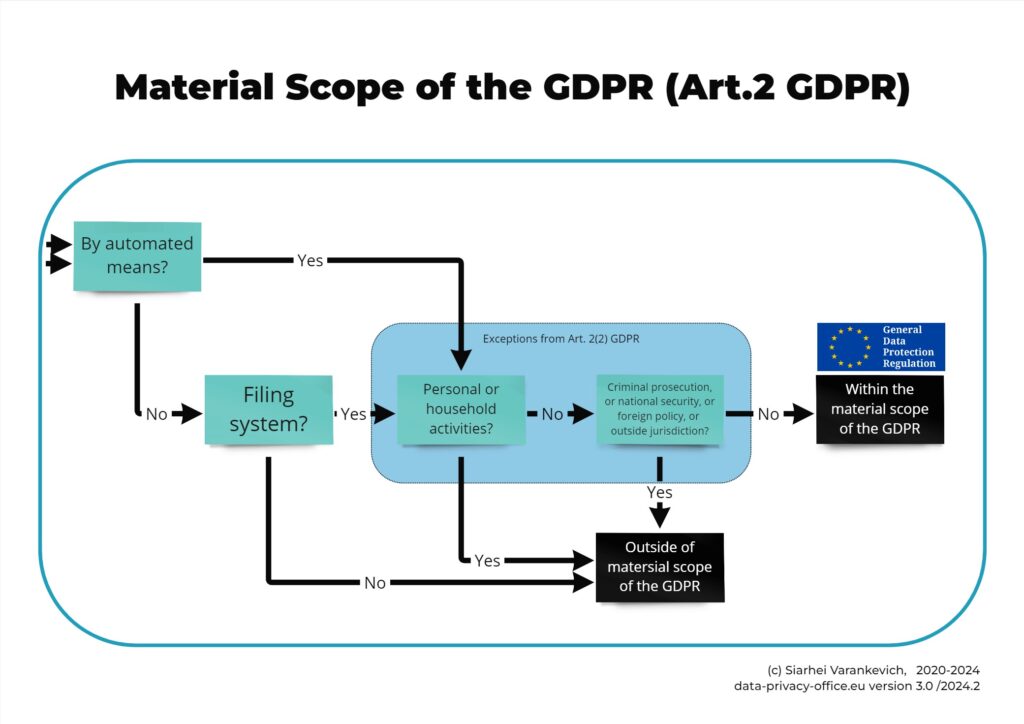(14) šiuo reglamentu užtikrinama apsauga turėtų būti taikoma fiziniams asmenims tvarkant jų asmens duomenis, neatsižvelgiant į jų pilietybę ar gyvenamąją vietą. Šis reglamentas neapimama juridinių asmenų ir visų pirma su juridinio asmens statusą turinčių įmonių duomenų, įskaitant juridinio asmens pavadinimą, teisinę formą ir kontaktinius duomenis, tvarkymo;
(14) The protection afforded by this Regulation should apply to natural persons, whatever their nationality or place of residence, in relation to the processing of their personal data. This Regulation does not cover the processing of personal data which concerns legal persons and in particular undertakings established as legal persons, including the name and the form of the legal person and the contact details of the legal person.
(15) siekiant, kad būtų išvengta rimtos teisės aktų apėjimo grėsmės, fizinių asmenų apsauga turėtų būti neutrali technologijų atžvilgiu ir turėtų nepriklausyti nuo taikomų metodų. Fizinių asmenų apsauga turėtų būti taikoma asmens duomenis tvarkant tiek automatizuotomis priemonėmis, tiek rankiniu būdu, jeigu asmens duomenys laikomi arba juos ketinama laikyti susistemintame rinkinyje. Šis reglamentas neturėtų būti taikomas pagal specialius kriterijus nesusistemintiems rinkiniams ar jų grupėms, taip pat jų tituliniams lapams;
(15) In order to prevent creating a serious risk of circumvention, the protection of natural persons should be technologically neutral and should not depend on the techniques used. The protection of natural persons should apply to the processing of personal data by automated means, as well as to manual processing, if the personal data are contained or are intended to be contained in a filing system. Files or sets of files, as well as their cover pages, which are not structured according to specific criteria should not fall within the scope of this Regulation.
(16) šis reglamentas netaikomas nei pagrindinių teisių ir laisvių apsaugai ar laisvo duomenų, susijusių su Sąjungos teisės nereglamentuojama veikla, pavyzdžiui, su nacionaliniu saugumu susijusia veikla, judėjimo klausimams. Šis reglamentas netaikomas asmens duomenų tvarkymui, kai asmens duomenis tvarko valstybės narės, vykdydamos su Sąjungos bendra užsienio ir saugumo politika susijusią veiklą;
(16) This Regulation does not apply to issues of protection of fundamental rights and freedoms or the free flow of personal data related to activities which fall outside the scope of Union law, such as activities concerning national security. This Regulation does not apply to the processing of personal data by the Member States when carrying out activities in relation to the common foreign and security policy of the Union.
(17) asmens duomenų tvarkymui Sąjungos institucijose, įstaigose, tarnybose ir agentūrose taikomas Europos Parlamento ir Tarybos reglamentas (EB) Nr. 45/2001 [6]. Reglamentas (EB) Nr. 45/2001 ir kiti Sąjungos teisės aktai, taikytini tokiam asmens duomenų tvarkymui, turėtų būti pataisyti pagal šiame reglamente nustatytus principus ir taisykles ir taikomi atsižvelgiant į šį reglamentą. Siekiant užtikrinti tvirtą ir suderintą duomenų apsaugos sistemą Sąjungoje, priėmus šį reglamentą turėtų būti atitinkamai pataisytas Reglamentas (EB) Nr. 45/2001, kad jį būtų galima taikyti tuo pačiu metu, kaip ir šį reglamentą;
(17) Regulation (EC) No 45/2001 of the European Parliament and of the Council [6] applies to the processing of personal data by the Union institutions, bodies, offices and agencies. Regulation (EC) No 45/2001 and other Union legal acts applicable to such processing of personal data should be adapted to the principles and rules established in this Regulation and applied in the light of this Regulation. In order to provide a strong and coherent data protection framework in the Union, the necessary adaptations of Regulation (EC) No 45/2001 should follow after the adoption of this Regulation, in order to allow application at the same time as this Regulation.
[6] Regulation (EC) No 45/2001 of the European Parliament and of the Council of 18 December 2000 on the protection of individuals with regard to the processing of personal data by the Community institutions and bodies and on the free movement of such data (OJ L 8, 12.1.2001, p. 1). https://eur-lex.europa.eu/legal-content/EN/AUTO/?uri=OJ:L:2001:008:TOC
(18) šis reglamentas netaikomas tais atvejais, kai asmens duomenis fizinis asmuo tvarko vykdydamas grynai asmeninę ar namų ūkio priežiūros veiklą ir nesusiedamas to su profesine ar komercine veikla. Asmeninę ar namų ūkio priežiūros veiklą gali sudaryti, be kita ko, susirašinėjimas ir adresų saugojimas arba naudojimasis socialiniais tinklais ir internetinė veikla, vykdoma atliekant tokią veiklą. Tačiau šis reglamentas taikomas duomenų valdytojams arba duomenų tvarkytojams, kurie suteikia priemones asmens duomenų tvarkymui vykdant tokią asmeninę ar namų ūkio priežiūros veiklą;
(18) This Regulation does not apply to the processing of personal data by a natural person in the course of a purely personal or household activity and thus with no connection to a professional or commercial activity. Personal or household activities could include correspondence and the holding of addresses, or social networking and online activity undertaken within the context of such activities. However, this Regulation applies to controllers or processors which provide the means for processing personal data for such personal or household activities.
(19) fizinių asmenų apsauga kompetentingoms valdžios institucijoms tvarkant asmens duomenis nusikalstamų veikų prevencijos, tyrimo, nustatymo ar traukimo baudžiamojon atsakomybėn už jas arba baudžiamųjų sankcijų vykdymo tikslais, įskaitant apsaugą nuo grėsmių visuomenės saugumui ir jų prevenciją, ir laisvas tokių duomenų judėjimas reglamentuojami specialiu Sąjungos teisės aktu. Todėl šis reglamentas neturėtų būti taikomas duomenų tvarkymo veiklai tokiais tikslais. Tačiau kai asmens duomenys, kuriuos valdžios institucijos tvarko pagal šį reglamentą, naudojami tais tikslais, jų tvarkymas turėtų būti reglamentuojamas konkretesniu Sąjungos teisės aktu, tai yra Europos Parlamento ir Tarybos direktyva (ES) 2016/680 [7]. Valstybės narės gali kompetentingoms valdžios institucijoms, kaip apibrėžta Direktyvoje (ES) 2016/680, pavesti užduotis, kurios nebūtinai atliekamos nusikalstamų veikų prevencijos, tyrimo, nustatymo ar traukimo baudžiamojon atsakomybėn už jas arba baudžiamųjų sankcijų vykdymo tikslais, įskaitant apsaugą nuo grėsmių visuomenės saugumui ir jų prevenciją, kad tais kitais tikslais atliekamas asmens duomenų tvarkymas tiek, kiek jis patenka į Sąjungos teisės taikymo sritį, patektų į šio reglamento taikymo sritį.
(19) The protection of natural persons with regard to the processing of personal data by competent authorities for the purposes of the prevention, investigation, detection or prosecution of criminal offences or the execution of criminal penalties, including the safeguarding against and the prevention of threats to public security and the free movement of such data, is the subject of a specific Union legal act. This Regulation should not, therefore, apply to processing activities for those purposes. However, personal data processed by public authorities under this Regulation should, when used for those purposes, be governed by a more specific Union legal act, namely Directive (EU) 2016/680 of the European Parliament and of the Council [7]. Member States may entrust competent authorities within the meaning of Directive (EU) 2016/680 with tasks which are not necessarily carried out for the purposes of the prevention, investigation, detection or prosecution of criminal offences or the execution of criminal penalties, including the safeguarding against and prevention of threats to public security, so that the processing of personal data for those other purposes, in so far as it is within the scope of Union law, falls within the scope of this Regulation.
Kalbant apie tų kompetentingų valdžios institucijų atliekamą asmens duomenų tvarkymą tikslais, patenkančiais į šio reglamento taikymo sritį, valstybės narės galėtų palikti arba nustatyti konkretesnes nuostatas šio reglamento taisyklių taikymui pritaikyti. Tokiomis nuostatomis gali būti tiksliau apibrėžti konkretūs reikalavimai dėl tais kitais tikslais tų kompetentingų valdžios institucijų atliekamo asmens duomenų tvarkymo, atsižvelgiant į atitinkamos valstybės narės konstitucinę, organizacinę ir administracinę struktūrą. Kai šis reglamentas taikomas privačioms įstaigoms tvarkant asmens duomenis, šiame reglamente valstybėms narėms turėtų būti numatyta galimybė konkrečiomis sąlygomis teisės aktais apriboti tam tikras prievoles ir teises, kai toks apribojimas yra būtina ir proporcinga priemonė demokratinėje visuomenėje siekiant apsaugoti konkrečius svarbius interesus, įskaitant visuomenės saugumą ir nusikalstamų veikų prevenciją, tyrimą, nustatymą ir traukimą baudžiamojon atsakomybėn už jas arba baudžiamųjų sankcijų vykdymą, įskaitant apsaugą nuo grėsmių visuomenės saugumui ir jų prevenciją. Tai aktualu, pavyzdžiui, kovojant su pinigų plovimu ar vykdant kriminalinių tyrimų laboratorijų veiklą;
With regard to the processing of personal data by those competent authorities for purposes falling within scope of this Regulation, Member States should be able to maintain or introduce more specific provisions to adapt the application of the rules of this Regulation. Such provisions may determine more precisely specific requirements for the processing of personal data by those competent authorities for those other purposes, taking into account the constitutional, organisational and administrative structure of the respective Member State. When the processing of personal data by private bodies falls within the scope of this Regulation, this Regulation should provide for the possibility for Member States under specific conditions to restrict by law certain obligations and rights when such a restriction constitutes a necessary and proportionate measure in a democratic society to safeguard specific important interests including public security and the prevention, investigation, detection or prosecution of criminal offences or the execution of criminal penalties, including the safeguarding against and the prevention of threats to public security. This is relevant for instance in the framework of anti-money laundering or the activities of forensic laboratories.
[7] 2016 m. balandžio 27 d. Europos Parlamento ir Tarybos direktyva (ES) 2016/680 dėl fizinių asmenų apsaugos kompetentingoms institucijoms tvarkant asmens duomenis nusikalstamų veikų prevencijos, tyrimo, nustatymo ar traukimo baudžiamojon atsakomybėn už jas arba baudžiamųjų sankcijų vykdymo tikslais ir dėl laisvo tokių duomenų judėjimo ir kuriuo panaikinamas Tarybos pamatinis sprendimas 2008/977/TVR (žr. šio Oficialiojo leidinio p. 89).
[7] Directive (EU) 2016/680 of the European Parliament and of the Council of 27 April 2016 on the protection of natural persons with regard to the processing of personal data by competent authorities for the purposes of prevention, investigation, detection or prosecution of criminal offences or the execution of criminal penalties, and the free movement of such data and repealing Council Framework Decision 2008/977/JHA (see page 89 of this Official Journal).
(20) nors šis reglamentas, inter alia, taikomas ir teismų bei kitų teisminių institucijų veiklai, Sąjungos ar valstybės narės teisėje galėtų būti nurodytos duomenų tvarkymo operacijos ir duomenų tvarkymo procedūros tvarkant asmens duomenis teismuose bei kitose teisminėse institucijose. Siekiant apsaugoti teisminių institucijų nepriklausomumą vykdant jų teismines užduotis, įskaitant jų sprendimų priėmimo nepriklausomumą, priežiūros institucijų kompetencijai neturėtų priklausyti asmens duomenų tvarkymas teismams vykdant jų teismines funkcijas. Tokių duomenų tvarkymo operacijų priežiūrą turėtų būti galima pavesti konkrečioms valstybės narės teismų sistemos įstaigoms; visų pirma jos turėtų užtikrinti, kad būtų laikomasi šiame reglamente nustatytų taisyklių, skatinti teisminių institucijų narių informuotumą apie jų prievoles pagal šį reglamentą ir nagrinėti su tokiomis duomenų tvarkymo operacijomis susijusius skundus;
(20) While this Regulation applies, inter alia, to the activities of courts and other judicial authorities, Union or Member State law could specify the processing operations and processing procedures in relation to the processing of personal data by courts and other judicial authorities. The competence of the supervisory authorities should not cover the processing of personal data when courts are acting in their judicial capacity, in order to safeguard the independence of the judiciary in the performance of its judicial tasks, including decision-making. It should be possible to entrust supervision of such data processing operations to specific bodies within the judicial system of the Member State, which should, in particular ensure compliance with the rules of this Regulation, enhance awareness among members of the judiciary of their obligations under this Regulation and handle complaints in relation to such data processing operations.
(21) šiuo reglamentu nedaromas poveikis Europos Parlamento ir Tarybos direktyvos 2000/31/EB [8], visų pirma jos 12–15 straipsniuose įtvirtintų tarpinių paslaugų teikėjų atsakomybės nuostatų, taikymui. Ta direktyva siekiama prisidėti prie tinkamo vidaus rinkos veikimo užtikrinant laisvą informacinės visuomenės paslaugų judėjimą tarp valstybių narių;
(21) This Regulation is without prejudice to the application of Directive 2000/31/EC of the European Parliament and of the Council [8], in particular of the liability rules of intermediary service providers in Articles 12 to 15 of that Directive. That Directive seeks to contribute to the proper functioning of the internal market by ensuring the free movement of information society services between Member States.








(EN) This article limits the scope of the GDPR. The European legislators have decided not to burden the majority of the population with numerous rules in the household and private life. They removed from the Regulation the processes of processing that do not pose a big threat (not automated processing where personal data is not collected in the system).
The combination “automated means” covers primarily…
…
Prisijungti
norėdami pasiekti visą tekstą